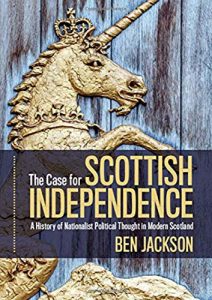In The Case for Scottish Independence: A History of Nationalist Political Thought in Modern Scotland, Ben Jackson offers a new history of the political and theoretical debates that have provided the intellectual foundations for Scottish nationalism as a social and political movement. This is a hugely important contribution to British political history and a work that will doubtlessly become part of the canon on Scottish politics, writes Jennifer Thomson.
This book review has been translated into Mandarin by Holly McKenzie (LN814, teacher Dr Lijing Shi) as part of the LSE Reviews in Translation project, a collaboration between LSE Language Centre and LSE Review of Books. Please scroll down to read this translation or click here.
The Case for Scottish Independence: A History of Nationalist Political Thought in Modern Scotland. Ben Jackson. Cambridge University Press. 2020.
 The COVID-19 pandemic has brought devolution to the forefront of British politics. The different policies that the four separate nations of the United Kingdom have adopted to fight the virus (and the differing results), and the various policy problems that it has thrown up, have acted as an almost daily reminder of the multi-level, and often competing, nature of governance across the UK. Indeed, there is a growing suggestion that the pandemic may be contributing to a strengthening of support for Scottish independence. On top of Brexit, and a ruling Conservative government at Westminster which enjoys very little support in Scotland, a global pandemic may be the final straw for the Union.
The COVID-19 pandemic has brought devolution to the forefront of British politics. The different policies that the four separate nations of the United Kingdom have adopted to fight the virus (and the differing results), and the various policy problems that it has thrown up, have acted as an almost daily reminder of the multi-level, and often competing, nature of governance across the UK. Indeed, there is a growing suggestion that the pandemic may be contributing to a strengthening of support for Scottish independence. On top of Brexit, and a ruling Conservative government at Westminster which enjoys very little support in Scotland, a global pandemic may be the final straw for the Union.
In the light of this, Ben Jackson’s The Case for Scottish Independence: A History of Nationalist Political Thought in Modern Scotland is particularly timely. It provides much-needed contextualisation to the still very recent political phenomenon that is Scottish nationalism. His book is an intellectual history of the ‘conception and theorisation’ (8) of the ideas behind Scottish nationalism. As such, this is a consciously elite study (focusing almost exclusively, as Jackson acknowledges, on the writings of men (10-11)) and speaks less to the lived reality of nationalism and its politics for ordinary Scots. As Jackson writes in the introduction, this focus is warranted given that the intellectual underpinnings of Scottish nationalism have not been given sustained academic consideration and that ‘existing accounts of Scottish nationalism have ascribed too little weight to the political ideas used by politicians, intellectuals and activists’ (6). The Case for Scottish Independence thus fills a key hole in the literature on Scottish nationalism by taking seriously the political and theoretical debates which provide the intellectual foundations for it as a social and political movement. As such, it represents a hugely important contribution to British political history, and it is a work which will doubtlessly become part of the canon on Scottish politics.
The book follows a loosely chronological structure, with the first chapter considering nationalist thinking prior to the 1960s, but the majority of the book focuses on the period from the 1960s onwards, when Scottish nationalism stepped into the political spotlight. The main structuring of the book is, however, along thematic lines, with each chapter focusing on one element of the debate around Scottish independence.

Image Credit: ‘IMG_3727’ by Alasdair Mckenzie licensed under CC BY 2.0
Following the introduction, the second chapter addresses the work of philosopher George Davie and arguments around the distinctive nature of the Scottish university system. Davie argued that Scottish higher education had focused on a more generalist and humanist model, as opposed to an English system which emphasised a more specific and narrow mode of study. As Jackson writes, such characterisations of Scottish intellectual and educational life as unique (and implicitly superior) to its southern counterpart ‘were only indirectly presented as arguments for Scottish independence’ (55), but nonetheless helped to create a sense that a particular and highly important aspect of Scottish culture was being eroded through the Union.
The successive chapters turn to consider imperialism and nationalism’s place on the left-right political spectrum respectively. Jackson addresses the work of political theorist Tom Nairn to survey the impact that the gradual loss of the British Empire following the Second World War, and the respective weakening of British identity, had in the nationalist imagination. He argues that there has been little serious place in nationalist thought for the idea that Scotland was ever in a ‘colonial relationship’ with England, ‘at least in the most common sense of that term’, but that the ‘loss of political autonomy after 1707 also led to some loss of cultural autonomy’ (88), leading to what Nairn referred to as ‘self-colonisation’.
The following chapter illustrates how this perceived difference has been enunciated with regards to political economy. As it outlines, the positioning of the Scottish National Party (SNP) to the left of Scottish Labour is a relatively recent phenomenon. The chapter focuses largely on the work of the ’79 group, a collective of longstanding supporters of independence, including future First Minister Alex Salmond, which was formed in the aftermath of the 1979 failed referendum on devolution. It illustrates how the development of economic policy in nationalist thinking has fluctuated in recent decades, moving from a Scandinavian model of high tax and spend to an Irish model of low corporation tax comforted through the protective cushioning of European Union (EU) membership. Jackson paints a picture of an economic policy which is distinctly less radical than the manner in which much mainstream UK coverage of Scottish politics tends to discuss Scotland’s political economy, and which sounds distinctly risky in light of the 2008 financial crisis.
The final chapter considers the issue of sovereignty and nationalism’s evolving understanding of it. Jackson addresses this largely in relation to the Constitutional Convention of the 1980s and the UK’s membership of the EU. The SNP’s strong support for the EU in recent decades sometimes appears to fly in the face of its support for independence from the other Union of which it is a member. As Jackson points out though, this pluralist approach reflects a ‘realpolitik’ – ‘as a small country, Scotland would need to find a place within international relations’ (146) and the EU would be a key part of this. As discussed above, the EU grew to represent a welcoming home in the understanding of a future independent Scotland, a community for small states which reflected a growing interest by nationalists in ‘Ireland’s successful transformation into a vibrant European economy’ (158).
Jackson’s work is an important reminder that Scottish nationalism remains a political phenomenon that has only really emerged at the forefront of the public imagination in recent decades. As such, it remains a particularly interesting development for historians and social scientists to attempt to explain. Implicit in the varied sources and thinkers that Jackson draws upon is the fact that there is no obvious enemy of the Scottish nation – no great, grand narrative of historical oppression to be told, as in the vein of Ireland. There is not even a distinctively separate identity as in the linguistic and cultural nationalism of Quebec or Catalonia (or, closer to home, Wales). As Jackson outlines, the history of nationalist thought in Scotland has been diffuse, and has at times fluctuated quite dramatically across the political spectrum, particularly with regards to its economic policy: ‘its character has been a contingent one, its rationale shifting in response to wider intellectual and social trends’ (175). The main glue for nationalist sentiment was, and remains, anger at the fundamental and profoundly negative legacy that Thatcherism had on the economy, institutions and people of Scotland.
Jackson ends on a note of caution for the SNP, pointing out that much of the debate he analyses in the book has happened outside of the confines of the party and that ‘even in the devolutionary era, Scottish nationalists remained reluctant to engage each other in spirited public debate about their political objectives’ (176). Such an admonishment seems important, especially in the context of the upcoming Holyrood elections in the spring of 2021 which, should they return a clear SNP majority, may provide the impetus for the party to argue for a second referendum from Westminster. Without a clear understanding of what the goals of independence are, and without an acknowledgement of multiple glaring failings that the party have presided over whilst in government (recent school exam results being just one), the party may fail to appeal outside of their core base. As Jackson appears to argue in closing, Scotland deserves a bigger and better debate about what it is and where it is going. A key part of this is understanding where it came from and how it has arrived at this particular point as a country –Jackson’s book is an essential component of that.
Note: This review gives the views of the author, and not the position of the LSE Review of Books blog, or of the London School of Economics.
书评:《苏格兰独立的理由现代苏格兰民族主义政治思想史》,本·杰克逊(Ben Jackson)著
Review translated by Holly McKenzie (LN814, teacher Dr Lijing Shi)
 新冠肺炎的蔓延使“权力下放”成为英国政治的焦点。组成大不列颠联合王国的四个国家针对病毒所采取的不同抗疫政策(和带来的不同结果),以及疫情引发的各种政策问题,几乎每天都在揭示着英国政府的治理属性 — 经常在多层面竞争。固然在英国脱欧以及缺乏苏格兰有力支持的英国中央政府保守政府执政的背景下,日益增多的人认为大流行会导致更多人支持苏格兰独立,但一个全球大流行或许会成为联合王国的最后一根救命稻草。
新冠肺炎的蔓延使“权力下放”成为英国政治的焦点。组成大不列颠联合王国的四个国家针对病毒所采取的不同抗疫政策(和带来的不同结果),以及疫情引发的各种政策问题,几乎每天都在揭示着英国政府的治理属性 — 经常在多层面竞争。固然在英国脱欧以及缺乏苏格兰有力支持的英国中央政府保守政府执政的背景下,日益增多的人认为大流行会导致更多人支持苏格兰独立,但一个全球大流行或许会成为联合王国的最后一根救命稻草。
为此,《苏格兰独立之理由:现代苏格兰民族主义政治思想史》一书的出版非常合时宜。它的作者是杰克逊(Ben Jackson)。该书为新近出现的政治现象 — 苏格兰民族主义,提供了急需的语境。杰克逊的书是一部对苏格兰民族主义背后思想进行 “概念化和理论化”的思想史(8)。因此,他的研究故意呈现出精英化的特点(杰克逊承认该本书几乎仅仅聚焦男性作品(10-11)),且很少描述苏格兰民族主义及其政治如何影响苏格兰老百姓的现实生活。正如杰克逊在绪论中写道:“之所以有此侧重是因为苏格兰民族主义的思想基础并未得到持续的学术考察,且对苏格兰民族主义现有的记载不够重视政客、知识分子与维权人士所使用的政治理念(6)”。因此,《苏格兰独立之理由》通过认真对待政治和理论的争辩填补了相关文献中的关键漏洞,这些争辩为苏格兰民族主义这一个社会和政治运动提供知识基础。 该书是英国政治历史的代表之作,毫无疑问,该作品将成为苏格兰政治经典的一部分。
此书大致遵循时间脉络。第一章讨论了60年代以前的苏格兰民族主义思想,大部分内容则集中在60年代后的时期,即苏格兰民族主义成为政治焦点的时期。然而,本书的主要结构却沿主题路线,通过每个章节聚焦苏格兰独立争辩中的一个要素具体展开。

Image Credit: ‘IMG_3727’ by Alasdair Mckenzie licensed under CC BY 2.0
绪论之后,第二章讨论了乔治·戴维哲学家的书籍,以及关于苏格兰大学体系独特性的论点。戴维提出,苏格兰高等教育重视一种更加通才与人文主义的典范。相对之下,英格兰高等教育更加强调具体单一的学习模式。正如杰克逊写道,戴维所表征的苏格兰知识与教育生活比英格兰更具有独特性(隐含优越性)的论点“只是为了间接支持苏格兰独立”(55),尽管如此,该论点有助于产生一种印象:苏格兰文化中的一个十分重要的因素被联合王国侵蚀了。
后续各章转向分别探讨帝国主义与民族主义在左-右政治范围内的位置。杰克逊强调了政治理论家汤姆·奈恩(Tom Nairn)的著作。 它旨在调查第二次世界大战后大英帝国的逐渐衰弱,以及相关的英国身份瓦解对民族主义想象的影响。奈恩争论说:苏格兰曾经与英格兰有过“殖民关系”的观点在民族主义思想中没有被认真考虑过,“至少在对该术语的最基本的理解上”;但是“苏格兰1707年以后失去政治自治也导致了一些文化自治权的丧失”(88)即,奈恩所提出的“自我殖民化”。
下一章描述了如何从政治经济学角度阐明苏英关系中的这种感知差异。正如其概述指出,将苏格兰民族主义党(SNP)视为工党左翼是一个较新的现象。本章集中在探讨“七九年集团”(‘79 group)的工作。在1979年权力下放的全民公决失败之后,一群长期支持独立者组成了“七九年集团”,其中也包括未将担任苏格兰首席大臣的亚历克斯·萨蒙德(Alex Salmond)。该章节说明近年来民族主义思想下的经济政策如何波动: 从“高税收高支出”的北欧模式改变为通过欧盟成员国的保护性缓冲而获得“低公司税”的爱尔兰模式。与许多英国主流政治媒体报道苏格兰的政治经济相比,杰克逊所描绘的经济政策明显比许多英国主流政治媒体报道苏格兰的政治经济温和。鉴于2008年的金融危机, 他的言论风险较低。
最后一章探讨了主权问题以及苏格兰民族主义者对此不断加深的理解。杰克逊讨论了80年代的 “宪法惯例”与英国欧盟会员资格中的主权问题。近几十年来,苏格兰民族主义党一直大力支持加入欧盟,这有时与他们支持苏格兰独立的主张背道而驰。但是,正如杰克逊强调的那样,多元的方针反映了“现实政治”,也就是说 “作为一个小国,苏格兰需要在国际政治舞台上找到自己的位置” (146页),并且欧盟是其中的关键。正如上文提到,欧盟逐渐被认为是一个支持苏格兰独立的温馨之家及小国共同体。这种看法反映了苏格兰民族主义者日益欣赏“爱尔兰成功转变为一个充满活力的欧洲经济体”(158)的经验。
杰克逊著作的重要意义在于它提醒世人:苏格兰民族主义仍然是一种政治现象,虽然它近几十年来才出现在公众想象的最前沿。因此,有许多历史学家与社会学家试图去解释这一有趣的现象。在杰克逊所引用的各种思想家和文献中都隐含了一个前提:与爱尔兰不同,苏格兰民族缺乏明显的敌人,没有历史压迫的宏伟叙事可说。魁北克和加泰罗尼亚(或者更接近苏格兰的威尔士)的民族主义是建立在语言与文化的差异之上,但苏格兰甚至连一个与英格兰截然不同的身份都没有。正如杰克逊概述,从历史上看,苏格兰民族主义思想分散在政治光谱上的每一处,特别是在经济政策方面:“它的内容视情况而定,其原理随着思潮与社会趋势而改变”(175页)。将苏格兰民族主义者凝聚在一起的依然是对撒切尔主义(Thatcherism)的愤怒,因为它给苏格兰的经济、公共机构及人民带来了全面而深刻的负面影响。
最后,杰克逊特别提醒SNP(苏格兰民族党)。他在书里分析的政治争辩已经发生在无党派人士之中,并指出“甚至在权力下放的时代中,持不同主张的苏格兰民族主义者们仍然不愿意坚定地公开讨论他们的政治目标”(176页)。苏格兰议会选举将于2021年春季举行,如果SNP占议会多数席位,那么杰克逊的训诫将有助于该党在英国议会争取第二次独立公投。如果对独立的目标缺乏清晰的认知,或者没有从SNP执政期间犯下的许多重大错误中汲取教训(其中之一是最近的高中考试成绩下降),那么该党可能无法吸引其铁杆支持者之外的人。杰克逊得出的结论是,人们应该对苏格兰的现状以及它的发展方向进行更广泛深入的辩论。 其中的关键部分是了解苏格兰的历史渊源以及它之所以成为现在这样一个国家的路径。而如果想要了解这些内容,杰克逊的书就不容错过。






